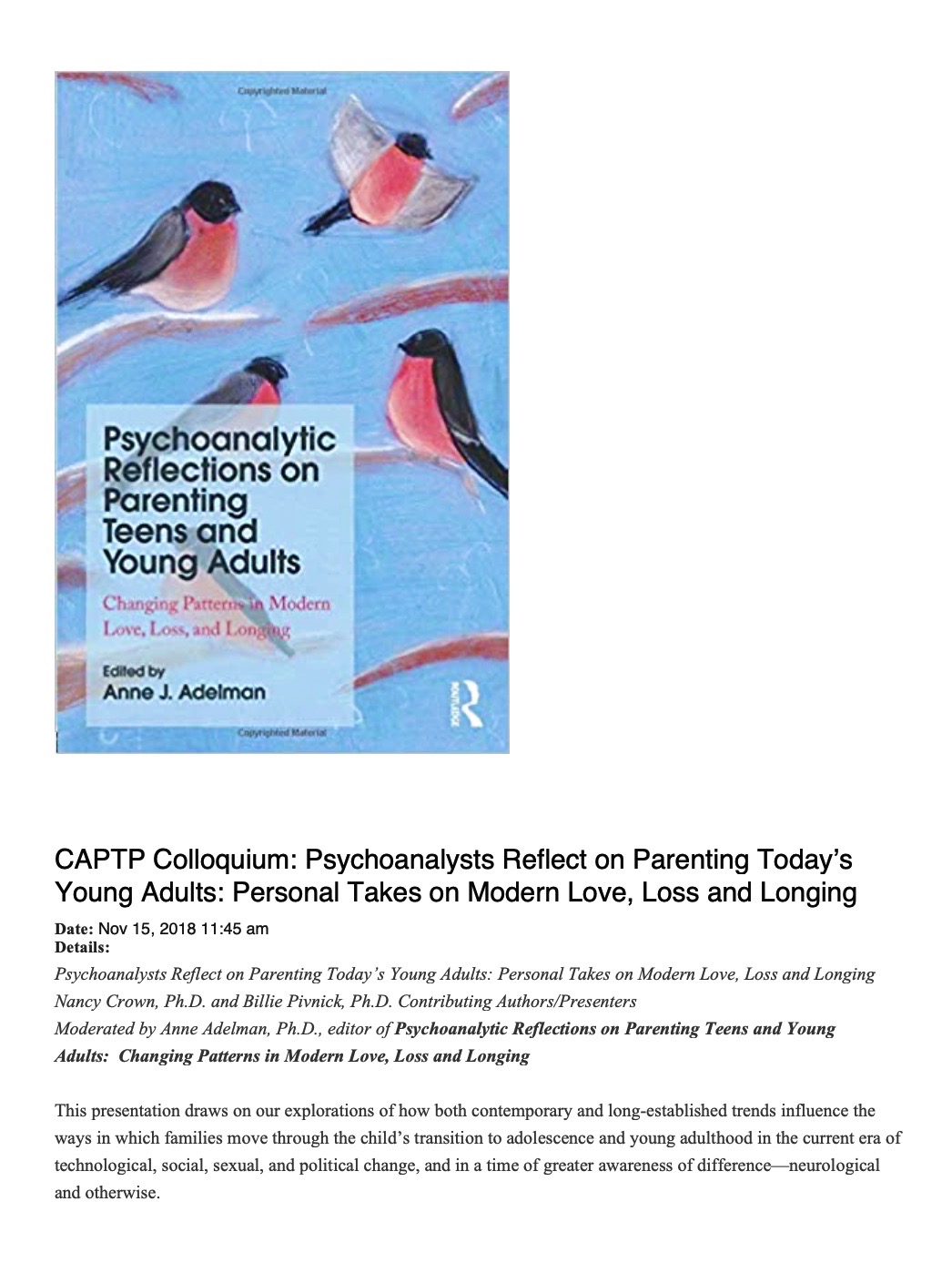Workshops & Speaking Engagements
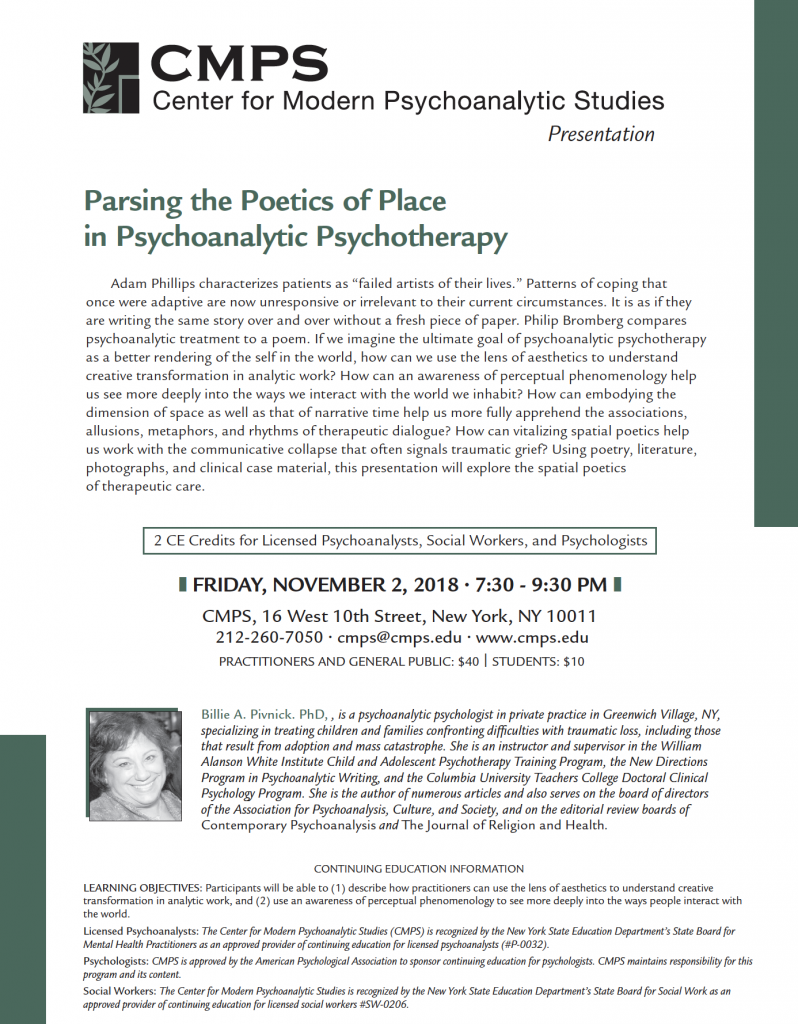
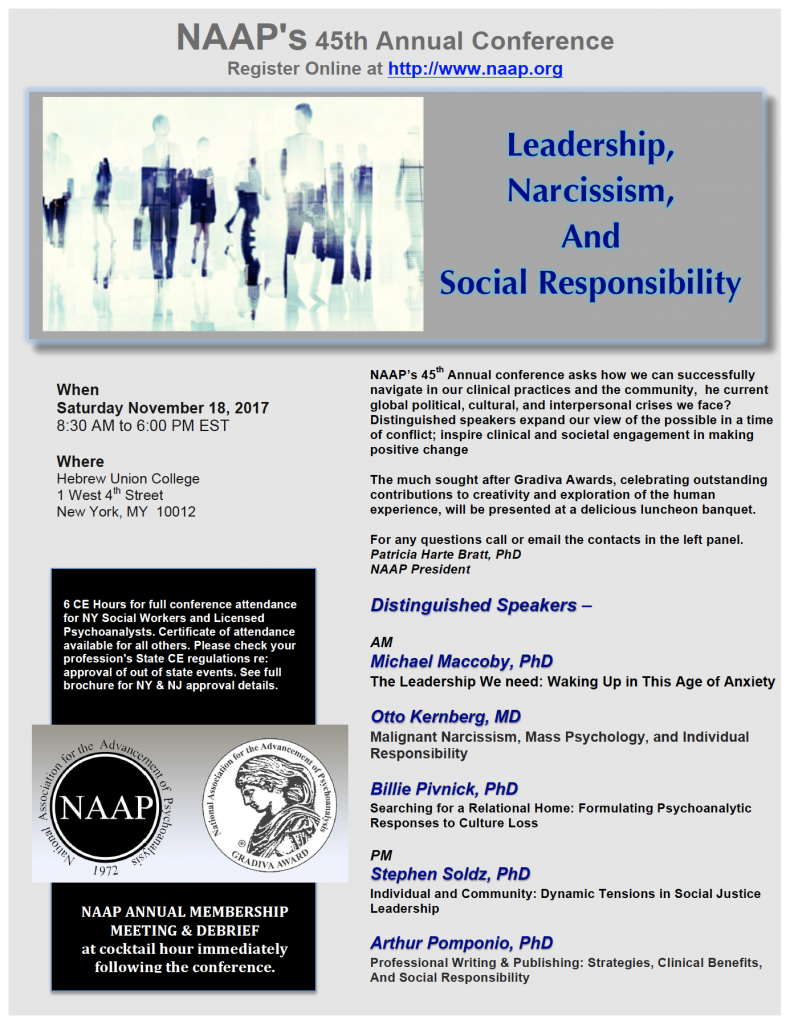
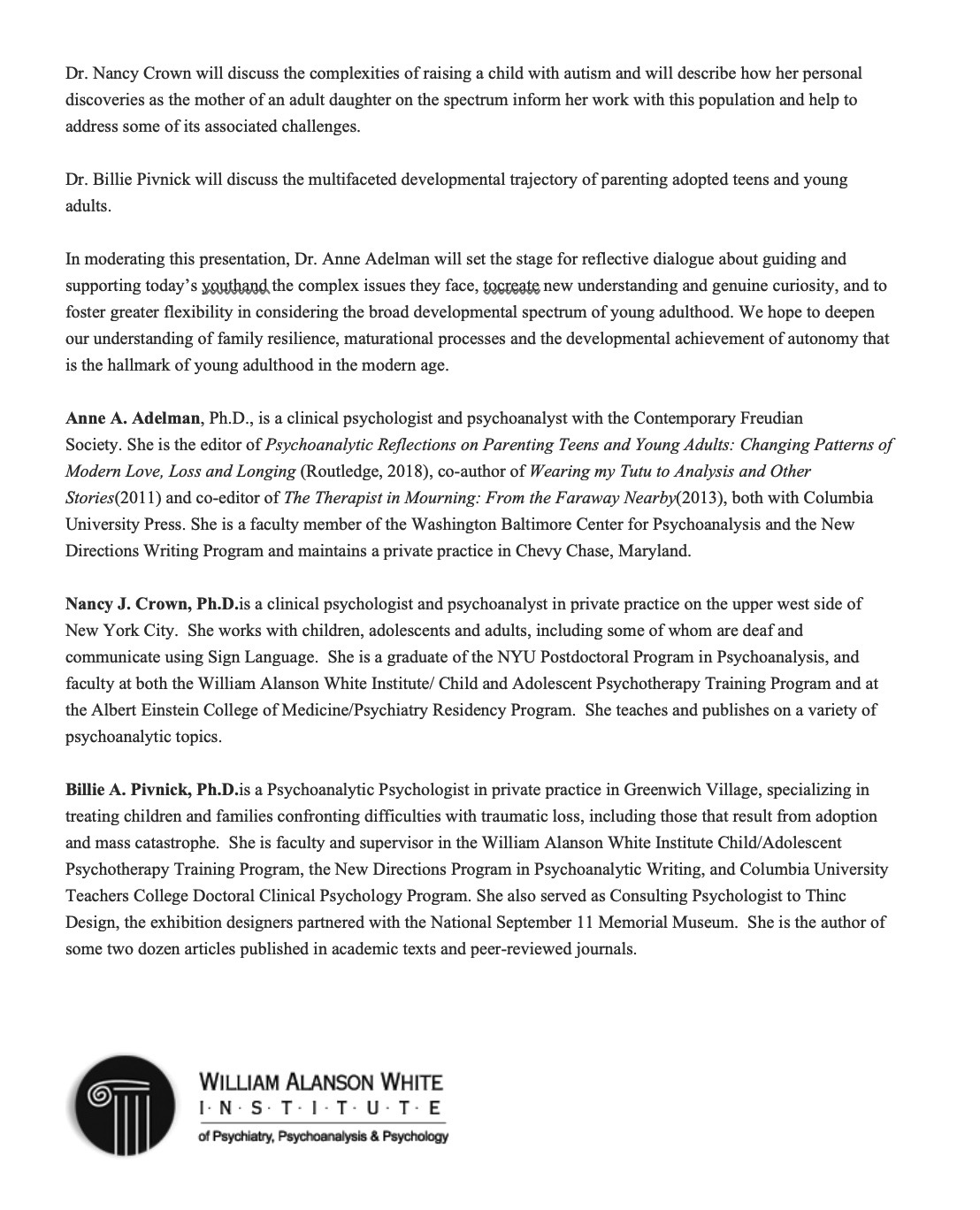

Lost in Translation, Found in Relation: Treating Adoptees & their Families
 A workshop lead by Billie A. Pivnick, PhD
A workshop lead by Billie A. Pivnick, PhD
with filmmaker Stephanie Wang-Breal
April 6, 2013; 10:00 am – 3:00 pm
A narrative approach to adoption can open new lines of exploration – making room for curiosity in adoptees, adoptive families, and those called on to assist them. Gaps in self-experience create moments in family life and psychotherapy with adoptees that can be characterized as being “left without a word.” Our aim in therapy is to help these adoptees move from feeling “lost in translation” to feeling “found in relation.” This workshop will illustrate the implicit paradoxes inherent in moving from being born to being borne, demonstrating how a narrative approach can unfold. In the workshop, we will review clinical case material and view the award-winning documentary “Wo Ai Ni (I Love You) Mommy,” including a discussion with filmmaker Stephanie Wang-Breal.
Billie Pivnick, PhD, an adoptive mother, is faculty and supervisor in the Child and Adolescent Psychotherapy Training Program at the White Institute. She is also on the faculty of the Institute for Contemporary Psychotherapy, the New Directions Program in Psychoanalytic Writing, and is consulting psychologist to the National September 11 Memorial & Museum. In her private practice she specializes in treating children, adolescents, and adults confronting difficulties with loss and trauma, including those resulting from adoption.
Stephanie Wang-Breal is the director/producer of the Emmy®-nominated documentary, Wo Ai Ni Mommy (I Love You, Mommy). The film has received numerous awards internationally and was broadcast on PBS. Ms. Wang-Breal also directs commercials, art videos for not-for-profit organizations, and stories for various media outlets. She is currently developing a documentary on the US child welfare system.
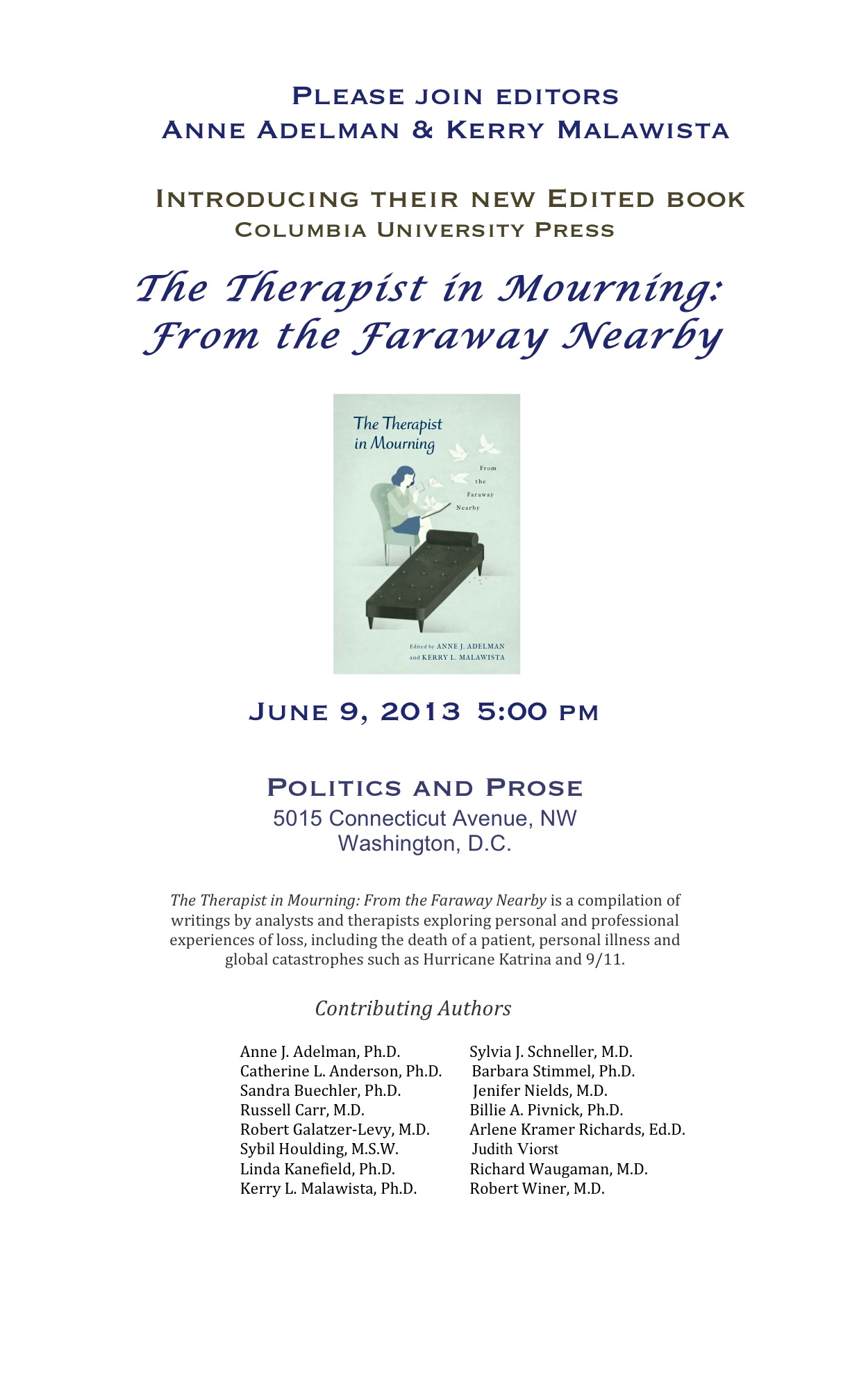
AFCAF/NY (Adoptive Families with Children of African Heritage and Their Friends, NY) in collaboration with FCCNY (Families with Children from China Greater New York) and the Adoption Initiative of St. John’s University, New York, present:
Transracial Adoption Parenting Workshop 7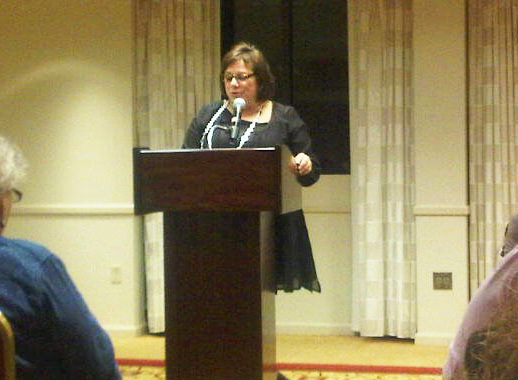
The Power of Normalcy: Destructive or Necessary?
Presenters: Kacy Ames & Billie Pivnick
Moderator: Kelly Sykes
May 14, 2013, 7pm
Saval Auditorium, St John’s University, Manhattan Campus, 101 Murray Street, New York, NY 10007.
The venue can be reached easily by subway: 1,2,3,4 and 5, A and C, and N and R.
In adoptive families there is always a tension between being different, and the acknowledgement of that difference, and the characteristics of the world around, which often ask for adaptation. It is the tension between the adoptive mother and in a world of the biological mothers, the traumatized child and the ‘normal’ children around her or him, the black or chinese or christian child and the caucasian or Jewish or American parents. In how far needs the adoptive family to normalize itself and in how far can she be different, and how are the roles for each of the family members: can the black child stay black or will it become a so called oreo, can a white mother authentically embrace Chinese culture, etc. These questions and many more will be addressed by Kacy Ames-Heron and Billie Pivnick in two short presentations. Kelly Sykes will moderate the Q & A afterwards.
Kacy Ames-Heron, LCSW is a psychotherapist in New York City who works with individuals, couples and families that are touched by adoption. She received her Masters in Social Work from Columbia University and has done Post-Graduate training in Adoption Therapy, and Family and Couples Therapy from Hunter College School of Social Work and Ackerman Institute for the Family respectively. Kacy serves on the Board of All Together Now where she also runs a group for Tweens who are adopted. Kacy also writes a bi-monthly column for Adoption Today on topics relating to adoption from an adult adoptee perspective. Kacy currently maintains a private practice in New York City but has worked extensively in the Bronx with children and adults who have experienced complex trauma, including children and teenagers placed in foster care as well as parents whose children were removed to foster care. Kacy was adopted from South Korea when she was 4 1/2 months old. She has spoken nationally and internationally on themes of adoption including identity development, search and reunion, and love and attachment in couples touched by adoption. Kacy resides in New York City with her husband, daughters and two dogs.
Billie Pivnick, Ph.D., an adoptive mother and psychoanalytic psychologist, is faculty in the Child and Adolescent Psychotherapy Training Program at The Wm Alanson White Institute, the Institute for Contemporary Psychotherapy, the New Directions Program in Writing with a Psychological Edge, and is Consulting Psychologist to Thinc Design partnered with the National September 11th Memorial Museum. In her private practice she specializes in treating children, adolescents, and adults confronting difficulties with loss and trauma, including those resulting from adoption. Publications include: “Left without a Word: Learning Rhythms, Rhymes, and Reasons in Adoption” in Psychoanalytic Inquiry (2010) and “Being Borne: Contextualizing Loss in Adoption” in Psychoanalytic Perspectives (2013).
Kelly Sykes, PhD., happily accepted the invitation to moderate this series of talks, and is eager to learn, listen and delve deeper into this issue with such an impressive array of speakers. Dr. Sykes received her doctorate in clinical psychology from the New School For Social Research with an emphasis on child/adolescent development. She has a private practice in Brooklyn. Her research examined how family’s messages about race influence racial identity and perceptions of mistreatment in white and minority youth. Since that time and having worked with all sorts of family configurations, she recognizes the subjective nature of racial identity and how it evolves from each family’s unique racial narrative. Families vary greatly in the meaning and emphasis they place on race and whether it will matter in the success or failure of their children. She has found in her practice that the search for an “authentic” identity is often a search for a connection, and coherence and that this search invariably hopefully leads to a greater understanding of one’s family. Dr. Sykes also has a biracial adoptive sister who joined her family when she was six years old.

